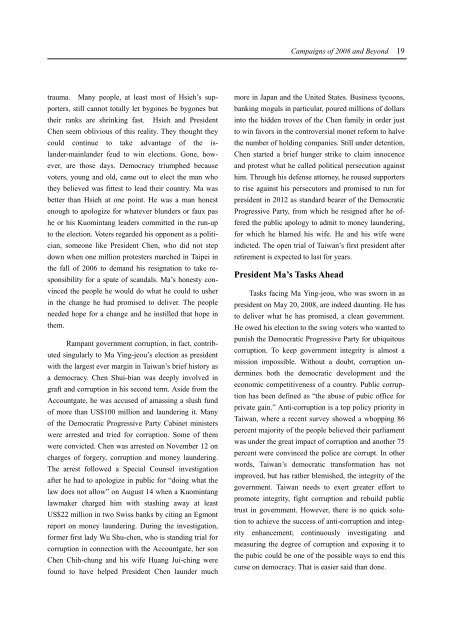PDF(2.7mb) - 國家政策研究基金會
PDF(2.7mb) - 國家政策研究基金會
PDF(2.7mb) - 國家政策研究基金會
You also want an ePaper? Increase the reach of your titles
YUMPU automatically turns print PDFs into web optimized ePapers that Google loves.
Campaigns of 2008 and Beyond 19<br />
trauma. Many people, at least most of Hsieh’s supporters,<br />
still cannot totally let bygones be bygones but<br />
their ranks are shrinking fast. Hsieh and President<br />
Chen seem oblivious of this reality. They thought they<br />
could continue to take advantage of the islander-mainlander<br />
feud to win elections. Gone, however,<br />
are those days. Democracy triumphed because<br />
voters, young and old, came out to elect the man who<br />
they believed was fittest to lead their country. Ma was<br />
better than Hsieh at one point. He was a man honest<br />
enough to apologize for whatever blunders or faux pas<br />
he or his Kuomintang leaders committed in the run-up<br />
to the election. Voters regarded his opponent as a politician,<br />
someone like President Chen, who did not step<br />
down when one million protesters marched in Taipei in<br />
the fall of 2006 to demand his resignation to take responsibility<br />
for a spate of scandals. Ma’s honesty convinced<br />
the people he would do what he could to usher<br />
in the change he had promised to deliver. The people<br />
needed hope for a change and he instilled that hope in<br />
them.<br />
Rampant government corruption, in fact, contributed<br />
singularly to Ma Ying-jeou’s election as president<br />
with the largest ever margin in Taiwan’s brief history as<br />
a democracy. Chen Shui-bian was deeply involved in<br />
graft and corruption in his second term. Aside from the<br />
Accountgate, he was accused of amassing a slush fund<br />
of more than US$100 million and laundering it. Many<br />
of the Democratic Progressive Party Cabinet ministers<br />
were arrested and tried for corruption. Some of them<br />
were convicted. Chen was arrested on November 12 on<br />
charges of forgery, corruption and money laundering.<br />
The arrest followed a Special Counsel investigation<br />
after he had to apologize in public for “doing what the<br />
law does not allow” on August 14 when a Kuomintang<br />
lawmaker charged him with stashing away at least<br />
US$22 million in two Swiss banks by citing an Egmont<br />
report on money laundering. During the investigation,<br />
former first lady Wu Shu-chen, who is standing trial for<br />
corruption in connection with the Accountgate, her son<br />
Chen Chih-chung and his wife Huang Jui-ching were<br />
found to have helped President Chen launder much<br />
more in Japan and the United States. Business tycoons,<br />
banking moguls in particular, poured millions of dollars<br />
into the hidden troves of the Chen family in order just<br />
to win favors in the controversial monet reform to halve<br />
the number of holding companies. Still under detention,<br />
Chen started a brief hunger strike to claim innocence<br />
and protest what he called political persecution against<br />
him. Through his defense attorney, he roused supporters<br />
to rise against his persecutors and promised to run for<br />
president in 2012 as standard bearer of the Democratic<br />
Progressive Party, from which he resigned after he offered<br />
the public apology to admit to money laundering,<br />
for which he blamed his wife. He and his wife were<br />
indicted. The open trial of Taiwan’s first president after<br />
retirement is expected to last for years.<br />
President Ma’s Tasks Ahead<br />
Tasks facing Ma Ying-jeou, who was sworn in as<br />
president on May 20, 2008, are indeed daunting. He has<br />
to deliver what he has promised, a clean government.<br />
He owed his election to the swing voters who wanted to<br />
punish the Democratic Progressive Party for ubiquitous<br />
corruption. To keep government integrity is almost a<br />
mission impossible. Without a doubt, corruption undermines<br />
both the democratic development and the<br />
economic competitiveness of a country. Public corruption<br />
has been defined as “the abuse of pubic office for<br />
private gain.” Anti-corruption is a top policy priority in<br />
Taiwan, where a recent survey showed a whopping 86<br />
percent majority of the people believed their parliament<br />
was under the great impact of corruption and another 75<br />
percent were convinced the police are corrupt. In other<br />
words, Taiwan’s democratic transformation has not<br />
improved, but has rather blemished, the integrity of the<br />
government. Taiwan needs to exert greater effort to<br />
promote integrity, fight corruption and rebuild public<br />
trust in government. However, there is no quick solution<br />
to achieve the success of anti-corruption and integrity<br />
enhancement; continuously investigating and<br />
measuring the degree of corruption and exposing it to<br />
the pubic could be one of the possible ways to end this<br />
curse on democracy. That is easier said than done.

















